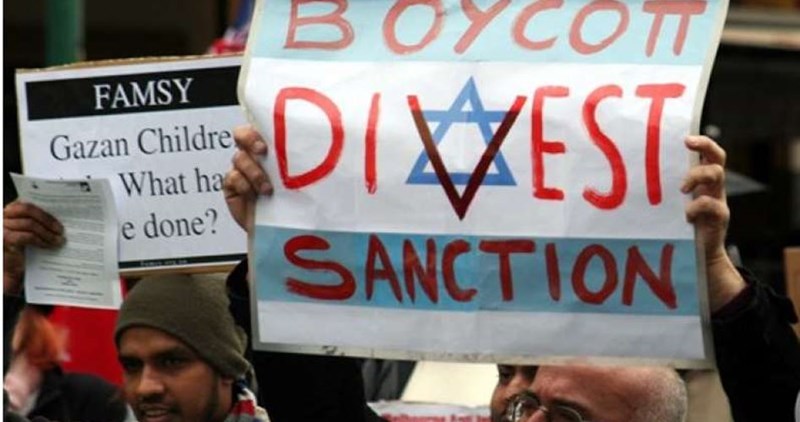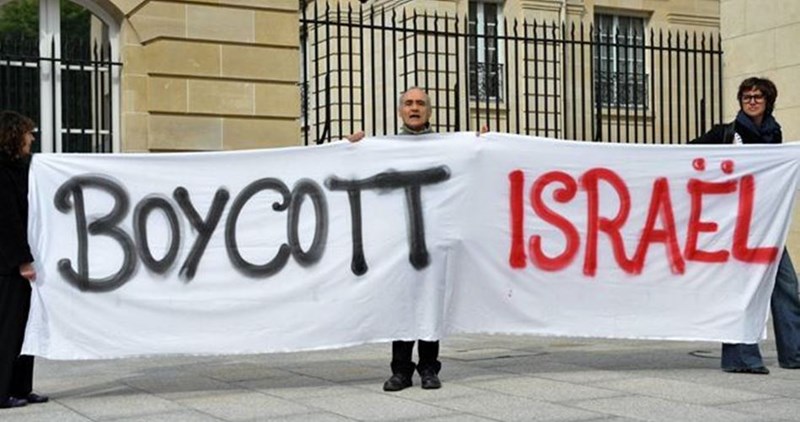www.aljazeerah.info
Opinion Editorials, May, 2016
Archives
Mission & Name
Conflict Terminology
Editorials
Gaza Holocaust
Gulf War
Isdood
Islam
News
News Photos
Opinion Editorials
US Foreign Policy (Dr. El-Najjar's Articles)
www.aljazeerah.info
Netherlands, After Sweden, Upholds the Right to Boycott the Apartheid Israeli Regime
a BDS Statement
Al-Jazeerah, CCUN, May 30, 2016
 |
 |
Netherlands, after Sweden, upholds the right to boycott Israel, “dealing serious blow” to Israel’s lawfare
-
Dutch foreign minister: BDS “protected by freedom of expression.”
-
352 European human rights organizations, church groups, trade unions and
political parties call on EU to support the right to boycott, as a means
to challenge Israeli violations of international law.
-
Int’l Federation for Human Rights (FIDH) defends the right to BDS.
The Netherlands has become the second state in the European Union (EU) to publicly state that calls for a boycott of Israel should be protected according to the principle of freedom of expression, dealing a serious blow to Israel’s relentless war of repression aimed at criminalizing the Boycott, Divestment and Sanctions (BDS) movement.
In response to questions posed recently to the Dutch government by Green Left MP Rik Grashoff on Israel’s threats against human rights defenders who are active in the BDS movement, the Dutch Minister of Foreign Affairs, Bert Koenders, stated that, "Statements or meetings concerning BDS are protected by the freedom of expression and freedom of assembly, as enshrined in the Dutch Constitution and the European Convention on Human Rights.”
Revealing that Israel regularly raises the topic of BDS in bilateral meetings with the Dutch government, Koenders reiterated his government’s opposition to the boycott of Israel but insisted that “endorsing BDS falls under freedom of expression.”
Reacting to this significant development, Riya Hassan, Europe coordinator for the Palestinian BDS National Committee (BNC), the broadest coalition in Palestinian civil society that is leading the global BDS movement, said:
“With the Netherlands joining Sweden in defending the right to advocate and campaign for Palestinian rights under international law through BDS, Israel’s attempt to get the BDS movement outlawed in Europe and to bully its supporters into silence has been dealt a serious blow.”
In March 2016, the Swedish foreign ministry reaffirmed basic democratic principles by stating that BDS “is a civil society movement” and that “governments should not interfere in civil society organization views.”
More than 350 European human rights organizations, trade unions, church groups and political parties, some of whom do not yet endorse BDS, have called on the European Union to support the right to boycott Israel in response to its occupation and violations of Palestinian rights.
Riya Hassan added, “Across European civil society, there is a fast spreading recognition of the BDS movement as a legitimate form of nonviolent, grassroots human rights advocacy for the UN-stipulated rights of the Palestinian people. Yet, the EU bureaucracy remains deeply complicit not only in protecting and maintaining Israel’s grave violations of international law but also in fighting what has proven to be the most effective form of solidarity with the Palestinian struggle to bring an end to these violations.”
The EU ambassador to Tel Aviv participated in the largest anti-BDS
conference sponsored by a right wing, anti-Palestinian Israeli media outlet
in Jerusalem in March and
refused to condemn the latest Israeli threats against Palestinian human
rights defenders, including the threat made by the Israeli Minister of
Interior of using “targeted civil eliminations” against BDS leaders.
Riya Hassan added, “Instead of shamelessly sending their envoy to join
Israel’s war of propaganda, espionage and lawfare against this
Palestinian-led, global human rights movement, we urge the EU, its member
states, and France in particular, to join the Netherlands and Sweden in
guaranteeing the right to use BDS tactics to achieve Palestinian
self-determination.”
“The EU must also comply with its own policy of non-recognition of Israeli sovereignty in the occupied Arab territories of 1967 by, at a minimum, banning the import of products of Israeli companies that illegally operate in the occupied territories, suspending the EU-Israel Association Agreement and imposing a military embargo on Israel similar to that imposed on apartheid South Africa.”
The impressive growth in recent years of support for the BDS movement in mainstream trade unions, churches and pension funds, as well as among student governments, academic associations, racial justice movements, LGBTQ groups and artists across the world, has prompted the Israeli establishment to admit the strategic impact of BDS.
The fact that large European companies such as Veolia, Orange and G4S are abandoning or announcing plans to leave the Israeli market following BDS campaigns is also particularly worrying for Israel.
In a desperate attempt to suppress BDS from above, after failing to win many battles for the hearts and minds at the grassroots level, Israel and its influential lobby groups have launched an unprecedented global campaign to silence Palestinian narratives and criminalize BDS advocacy, especially in western countries.
Israeli-induced attacks on free speech and civil rights in Europe, the US and Canada, among others, are seen by BDS campaigners as fostering an “ominous environment of bullying, intimidation and repression that has all the hallmarks of the era of McCarthyism in the US and the worst days of the apartheid regime in South Africa.”
Riya Hassan concluded, “This should deeply concern not just activists supporting Palestinian rights, but all those who value civil liberties as well as progressive movements struggling for racial, gender, social, economic, indigenous and environmental justice.”
“We shall redouble our efforts at the grassroots and civil society BDS campaigning and advocacy levels to bring about EU compliance with the European Convention on Human Rights and international law, particularly as both pertain to the rights of human rights defenders to join the BDS movement for Palestinian freedom, justice and equality.”
Background:
- The Palestinian Human Rights Organizations Council (PHROC) affirmed in February 2016 “the right of all individuals to participate in and advocate for boycott, divestment, and sanction actions”, calling on states and businesses to “uphold their related legal responsibilities”.
- Amnesty International has condemned threats by Israeli ministers against BDS activists, expressing concern for their "safety and liberty" and upholding their right as human rights defenders to campaign "to hold Israel accountable for human rights and other international law violations and advocates for the use of non-violent means in doing so."
- Glenn Greenwald has described the repressive measures taken in the US and Europe against BDS human rights defenders as the “greatest threat to free speech in the West.”
- The American Civil Liberties Union has condemned these anti-democratic legislative attempts to suppress BDS.
- Human Rights Watch has condemned the effective travel ban imposed by Israel on Palestinian human rights defender and co-founder of the BDS movement Omar Barghouti stating: "Israel’s refusal to renew Barghouti’s travel document appears to be an effort to punish him for exercising his right to engage in peaceful, political activism, using its arsenal of bureaucratic control over Palestinian lives."
- The International Federation for Human Rights (FIDH), the second oldest human rights organization in the world, has recently formally recognized and reaffirmed “the right of individuals to peacefully participate in and call for boycott, divestment, and sanction (BDS) measures to protest against the Israeli government occupation and discrimination policies, and urges States to respect and uphold related rights of freedom of expression, opinion, association, and assembly.”
- The International Covenant on Civil and Political Rights (ICCPR) affirms the right to hold opinions without interference and the right to freedom of expression, as well as other interrelated rights such as the rights to freedom of assembly and association. While freedom of expression may be subject to restriction, the call for BDS does not fall within the narrow limitation outlined in the ICCPR. In 2014, the UN Human Rights Committee reviewing Israel’s implementation of the ICCPR has criticized the Israeli anti-boycott law in its report (paragraph 22) for this reason.
- In 2012, the UN Special Rapporteur on the promotion and protection of the right to freedom of opinion and expression confirmed in his report on Israel and the OPT (paragraph 34) that “Calling for or participating in a boycott is a form of expression that is peaceful, legitimate and internationally accepted.” The Palestinian Human Rights Organizations Council (PHROC) has called on states to respect the right to BDS on this basis.
- The right to freedom of expression is widely incorporated into the domestic legislation of states, and in practice, governments have in general accepted the right of their citizens to practice domestic and international boycotts as a means to end violations of human rights, including child and labor rights and environmental abuses. In some occasions, governments and public institutions have also provided at least partial support to such civil society campaigns, the most famous historical examples being the international boycott campaign against apartheid in South Africa and the Civil Rights movement in the United States.
- Legal protection of the right of citizens to boycott is particularly robust in states in which free speech is a constitutional right, such as in the United States. In light of the increasing willingness of US lawmakers to craft anti-BDS legislation explicitly tailored to protect Israel’s violations of international humanitarian law and human rights of the Palestinian people, civil rights organizations such as the New York branch of the American Civil Liberties Union (ACLU) have already made clear that:
“To uphold the right to engage in a boycott is not necessarily to support its aims or objectives – just as to uphold freedom of speech is not to endorse the ideas expressed. However, when advancing a bill that addresses the scope of politically motivated speech, assembly, association and expression, lawmakers are bound by certain first principles of a constitutional democracy. These principles compel government to promote, and to protect, the robust contest of ideas. The proposed legislation would violate these constitutional principles.”
***
Share this article with your facebook friends
|
|
|
|
||
|
||||||


